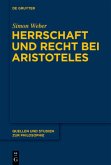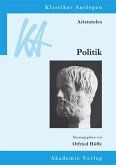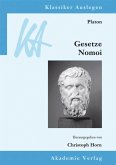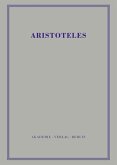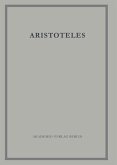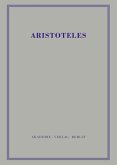What does Aristotle regard as the conditions of a legitimate relationship between political rule and the law? The interpretation of Aristotelian politics in this study shows that the central political project of the modern age – namely, the grounding and implementation of the natural rights of the individual – can be conceptualized as the continuation and embodiment of Aristotle’s political philosophy rather than a radical break from it.
Nicht wenige Autoren in der politischen Ideengeschichte sind der Überzeugung, dass die Grundpfeiler des modernen Rechts- und Verfassungsdenkens nicht als das Erbe oder die kontinuierliche Weiterentwicklung der aristotelischen Tradition zu betrachten sind, sondern als Neuerungen, die sich gerade dem radikalen Bruch mit ihr verdanken. Die entscheidende Demarkationslinie zwischen antikem und modernem politischem Denken verlaufe dabei entlang der Idee der natürlichen Rechte des Individuums: Erst die politische Philosophie der Neuzeit und die auf ihr fußende Verfassungswirklichkeit verhelfe dem Menschen zu seinen ihm angeborenen und unveräußerlichen Rechten. Die vorliegende Interpretation der aristotelischen Politik zeigt, dass das Kernanliegen der politischen Moderne, die Begründung und Durchsetzung der natürlichen Rechte des Individuums, jedoch als die Fortschreibung und Ausformulierung eines Grundgedankens von Aristoteles' politischer Philosophie begriffen werden sollte, nicht als radikaler Bruch mit ihr.
Nicht wenige Autoren in der politischen Ideengeschichte sind der Überzeugung, dass die Grundpfeiler des modernen Rechts- und Verfassungsdenkens nicht als das Erbe oder die kontinuierliche Weiterentwicklung der aristotelischen Tradition zu betrachten sind, sondern als Neuerungen, die sich gerade dem radikalen Bruch mit ihr verdanken. Die entscheidende Demarkationslinie zwischen antikem und modernem politischem Denken verlaufe dabei entlang der Idee der natürlichen Rechte des Individuums: Erst die politische Philosophie der Neuzeit und die auf ihr fußende Verfassungswirklichkeit verhelfe dem Menschen zu seinen ihm angeborenen und unveräußerlichen Rechten. Die vorliegende Interpretation der aristotelischen Politik zeigt, dass das Kernanliegen der politischen Moderne, die Begründung und Durchsetzung der natürlichen Rechte des Individuums, jedoch als die Fortschreibung und Ausformulierung eines Grundgedankens von Aristoteles' politischer Philosophie begriffen werden sollte, nicht als radikaler Bruch mit ihr.
"[...] by concentrating on the phenomenology of natural communities, the forms of natural rulership, and the interest theory of rights, Weber is to be commended for having given us new reasons for considering the possibility of ascribing a theory of natural rights to Aristotle and therefore for doubting the wisdom of drawing the line between ancient and modern political thought on the issue of individual natural rights. This is no small achievement that will surely be welcomed by Aristotelian scholars, particularly those interested in the bearing of Aristotle's work upon contemporary political thought."
Andrés Rosler in: Gnomon 5/90 (2018), 400-405
Andrés Rosler in: Gnomon 5/90 (2018), 400-405


